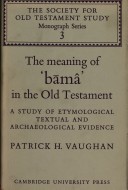This monograph is a study of the Hebrew word bama, which is used frequently in the Old Testament to describe cultic sites and has commonly been translated 'high place'. The word however occurs in a variety of contexts, which would indicate a wider range of meanings. By careful analysis of these occurrences in the Old Testament and by comparison with cognate words in Semitic languages and with the translations in the Septuagint, the author attempts to categorise these meanings and to challenge certain current views. Three groups of meanings of bama emerge from this study: topographical, as in 'hillside' and possibly 'grave-mound'; anatomical, as in 'backs' and possible 'beasts'; and cultic senses, as in 'cultic platform' (bamah) and by extension 'altar' and 'sanctuary'. This first book-length study of all aspects of the meaning of bama will be of interest equally to Old Testament scholars and archaeologists of the near East and is likely to be an invaluable monograph on its subject.
- ISBN13 9780521204255
- Publish Date 25 October 1974
- Publish Status Inactive
- Out of Print 17 November 2008
- Publish Country GB
- Imprint Cambridge University Press
- Format Hardcover
- Pages 104
- Language English
